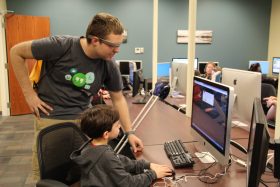Elon University students in a Winter Term "Burst the Bubble" course welcomed local children and their parents to campus in late January for activities that exposed youth to the academic and career possibilities of programming and software design.

For several Elon University students, the solution to that conundrum starts with a simple step: invite local children and their parents to campus to enjoy family activities that incorporate computer science.
The first ever “Hour of Code” hosted by students in a Winter Term “Burst the Bubble” course and the Department of Computing Sciences brought 130 children and their parents to campus Jan. 27, 2014, for introductory programming exercises, board games, Legos and other activities that fostered interest in computers and software design.
“There are very, very few opportunities to learn about computer science, not only in the Elon area but around the U.S.,” said Elon University senior Jeff Stern, a Lumen Scholar studying information science and the main organizer of the event. “But I think there’s a lot of interest. One reason there’s a lack of computer scientists is not that people don’t want to do it, they just haven’t been exposed to it.”
The evening gathering in Duke building included free pizza courtesy of Pandora’s Pies on Williamson Avenue. In survey feedback, parents raved about the activities and praised Stern’s initiative.
“I am so grateful to Elon for planning this event for the kids in the community,” one mother stated. “The computer science students who were helping the kids were wonderful – so very patient, kind, smart, and all were fantastic role models.”
Stern conceptualized and led the Winter Term “Burst the Bubble” course, “Teaching Children (and Yourself) to Code,” to examine what “code” means, why children should learn it and how it can be integrated into school curricula. Sessions were comprised of discussion, guest speakers, demonstrations, and practice with websites, programs and board games made to teach kids how to code or, on a fundamental level, the logic used in coding.
“Burst the Bubble” programs are free, student-led, non-credit sessions over Winter Term on subjects not covered in a typical college classroom. The courses are open to all Elon University students. Fifteen people enrolled in Stern’s class, and much of the same group volunteered to help at the “Hour of Code,” as did other computing sciences students from the department.
“Jeff believes strongly that students in schools should have the opportunity to learn computer science, and it was his passion and initiative that made the event happen and made it such a huge success,” said Associate Professor Barbara Taylor in the Department of Computing Sciences. “I would never have imagined such an enthusiastic response from the community – that so many parents would respond to Jeff’s invitation and not only bring their children, but sit by them while they had so much fun learning to code.”
For more information on computer programming for children, visit www.code.org.


